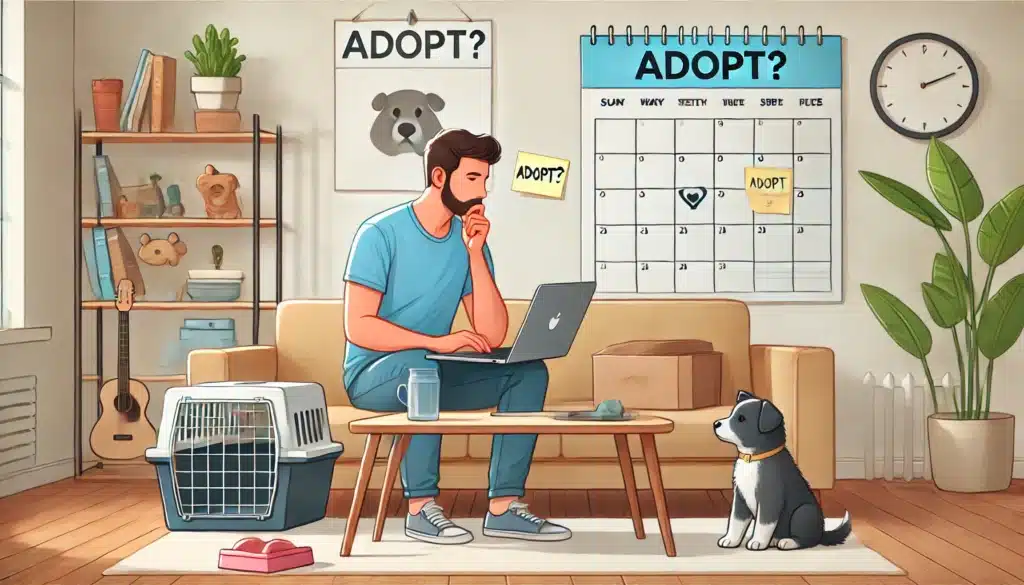Bringing a dog into your life is a joyful and rewarding experience — but it’s also a lifelong commitment. While the idea of adopting a dog might feel exciting at any time, timing plays a big role in setting the stage for a successful and stress-free transition.
So, when is the best time to adopt a dog? In this guide, we’ll explore the personal, seasonal, and lifestyle factors to consider before welcoming a new furry companion into your home.
Why Timing Matters
Adopting a dog isn’t just about choosing the right breed or age — it’s about choosing the right moment in your life. Dogs need time, attention, structure, and patience — especially during their first few weeks in a new environment.
Choosing the right time can:
- Make training easier
- Strengthen the bond between you and your dog
- Reduce stress for both of you
- Help avoid unwanted behavior problems
- Improve long-term success in the adoption
1. Consider Your Personal Schedule
The best time to adopt a dog is when you can dedicate extra time to helping them adjust.
Ideal conditions:
- You’re working from home or have time off (vacation, sabbatical, break between jobs)
- Your schedule is flexible — fewer meetings, social events, or travel
- You can spend several days at home to establish routines, start training, and build trust
- You’re emotionally prepared and ready for the responsibility
Avoid adopting during:
- Major life transitions (moving, new baby, career change)
- Busy or high-stress periods
- Times of travel or long absences
Success starts with being present.
2. Evaluate Your Financial Readiness
Dogs come with both expected and unexpected expenses.
Common costs:
- Adoption fee
- Vet checkups and vaccinations
- Spaying/neutering
- Food and supplies (bed, crate, leash, toys, etc.)
- Insurance or emergency medical costs
- Grooming and training
Before adopting, make sure you have a budget in place and a small emergency fund for your new companion’s needs.
3. Think About the Seasons
Believe it or not, the time of year can impact your dog’s adjustment.
🟢 Spring & Fall:
- Ideal weather for walks and training
- More daylight = easier routine building
- Fewer extremes in temperature
- Popular seasons for pet adoption events
🔴 Summer:
- Great if you’re off work or have more free time
- But: extreme heat can limit outdoor activity
- Travel plans may interfere with routine
🔵 Winter:
- House-training can be tougher in snow or cold
- Less outdoor socialization
- Holidays may cause distractions, visitors, or disruptions
Each season has pros and cons — choose what aligns with your lifestyle and climate.
4. Are You Emotionally Ready?
Dogs need more than food and walks — they need patience, love, and consistency. Ask yourself:
- Do I feel emotionally stable and calm?
- Am I prepared for sleepless nights (especially with a puppy)?
- Can I handle possible behavior challenges without frustration?
- Do I want to build a lasting bond with a dog?
Adopting a dog during an emotional low isn’t always the best time — but if you’re healing and ready for a connection, a dog can be incredibly therapeutic.
5. Family and Household Considerations
Is everyone in your household on board with the idea of a dog?
- If you live with others, make sure they agree on rules and responsibilities
- Discuss allergies, fears, or lifestyle changes
- Make a plan for who walks, feeds, trains, and plays with the dog
- If you have other pets, consider the best time to introduce a new animal without stress or conflict
A household that’s ready and supportive sets the tone for your dog’s success.
6. Puppies vs. Adult Dogs: Timing Differences
Puppies:
- Need near-constant supervision
- Require potty training, socialization, and structured play
- Best adopted when you have lots of free time and energy
Adult dogs:
- May already be house-trained
- Often need less supervision
- Ideal for those with structured routines or full-time jobs
Choose based on your current lifestyle, not just what sounds cute.
7. After a Loss: When Is It “Too Soon”?
If you’ve recently lost a dog, the question of “when” becomes even more emotional.
There’s no right timeline — some people need months or years to heal, while others adopt sooner and find comfort in it. Ask yourself:
- Am I looking for a new relationship, not a replacement?
- Can I love and accept a new dog for who they are — not who they remind me of?
- Am I emotionally ready to commit again?
Grieve at your own pace. A new dog should come into your life when your heart has space.
8. Planning Ahead Is Key
If you know you want to adopt in the future, start planning now.
- Research breeds, sizes, and energy levels that fit your lifestyle
- Start collecting supplies (bed, leash, bowls, etc.)
- Dog-proof your home
- Save for adoption and vet costs
- Research local shelters and adoption events
The more prepared you are, the more confident you’ll feel when the right moment arrives.
Final Thoughts: Choose the Time That Feels Right — Not Rushed
There’s no universal “perfect” time to adopt a dog — but there is a right time for you.
Adopting a dog should feel exciting, thoughtful, and purposeful — not impulsive. When your schedule, emotions, and lifestyle align, you’ll be more equipped to provide a safe, loving, and forever home.
So take your time. Do the prep work. And when you’re ready, your future best friend will be, too.







